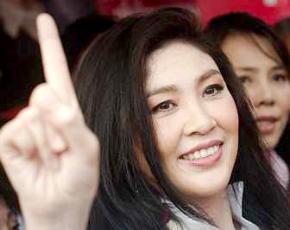Thailand’s vote against dictatorship
The party associated with Thailand's pro-democracy "Red Shirt" movement won a landslide victory in July 3 elections, making Yingluck Shinawatra Thailand's first woman prime minister and giving a parliamentary majority to a coalition led by the Puea Thai Party, the latest in a line of populist parties reaching back to the government of former Prime Minister Thaksin Shinawatra, who was overthrown in a military coup in 2006.
The vote was a decisive defeat for Prime Minister Abhisit Vejjajiva and the Democrat Party, which has been placed in power by the military twice in the past five years.
In May 2010, the military moved against the ongoing democracy demonstrations of the Red Shirt movement in Bangkok in other cities, using tanks and live ammunition against unarmed demonstrators who demanded new elections. Despite the conditions of repression, the Thai people turned out for Puea Thai--a testament to support for the ongoing struggle against the military and Thailand's undemocratic royalist system.
is a Thai dissident who was accused of "lese majesty"--essentially, not being loyal to the king--and forced to flee the country in 2009. He wrote this analysis of the election and what comes next.
THE THAI election results are a slap in the face for the dictatorship. They prove without any doubt that the majority of people have rejected the military, the Democrat Party and the royalist elites. Puea Thai, the party closely allied to the Red Shirt movement, has won a clear majority.
The result is all the more remarkable, given that the election was held under conditions of severe censorship and intimidation of the Red Shirt democracy movement by the military and the military-installed Democrat Party government of Prime Minister Abhisit Vejjajiva.
This election confirms that the Abhisit government never had a mandate from the people. It confirms that the 90 pro-democracy activists, who were shot down by military snipers last year, were shot in order to keep the Democrat Party and the military in power.
Every single election since 2001 has been won by the Thai Rak Thai or its descendants, Palang Prachachon and now Puea Thai. The latest results expose the lies of the military, the mainstream media, the liberal academics, the NGOs and the Democrat Party, all of whom supported the 2006 military coup and claimed that the coup was "necessary" because the majority of the electorate "didn't understand democracy" or was "bought off" in election frauds.

The latest election is a vindication of the struggles and sacrifices of the Red Shirts, and it proves the deep commitment to democracy among the majority of Thai citizens, especially the poor. But the important question after the election is whether the Puea Thai government will match the commitments to freedom and democracy shown by those who voted for it.
If Thailand is to shake off the legacy of the 2006 military coup and the subsequent destruction of the democratic process by the courts and the Abhisit government, this new government must take some immediate and important measures. These include:
1. The freeing of all political prisoners, including those jailed or charged under the notorious lèse majesté law.
2. The ending of censorship of all types, especially the Internet and community radio stations.
3. The sacking of the Army chief Gen. Prayut Junocha on the grounds that he sought to influence the outcome of the election and announced that he opposed Puea Thai policies in the South. The Army chief should be the servant of an elected government. He should never have special extra-constitutional powers to intervene in politics.
4. The indictment and trial of former Prime Minister Abhisit and his deputy Sutep, along with Gens. Anupong and Prayut on the grounds of murdering Red Shirt civilians last year.
5. The temporary reintroduction of the 1997 Constitution, instead of the present military constitution and the start of a process to rewrite the constitution to increase freedom and democracy.
6. The scrapping of the lèse majesté and computer crimes laws which prevent freedom of expression.
In the long term, Thai society must seek ways to totally reform the military, drastically cutting its budget and removing its control of the media. This will reduce its political influence. The justice system, which has been plagued by double standards, must also be seriously reformed, and measures should start in the process of building a welfare state in order to reduce inequality.
But it is doubtful whether the Puea Thai Party will have any intention of carrying out these necessary changes. It will be up to the Red Shirt movement to push the government into making more radical reforms rather than doing secret and dirty compromises with the military and the elites.
Of course, the Red Shirt movement has many factions within it. This is normal for such a large mass movement. Some will want to wind down the movement and leave the business of politics to the new government. This would be a serious mistake. The more radical sections of the movement must continue the struggle for justice and equality in order to bring about real changes.
This election is only one step towards restoring democracy. It will take mass participation of the Red Shirts in order to strengthen and speed up the process.


